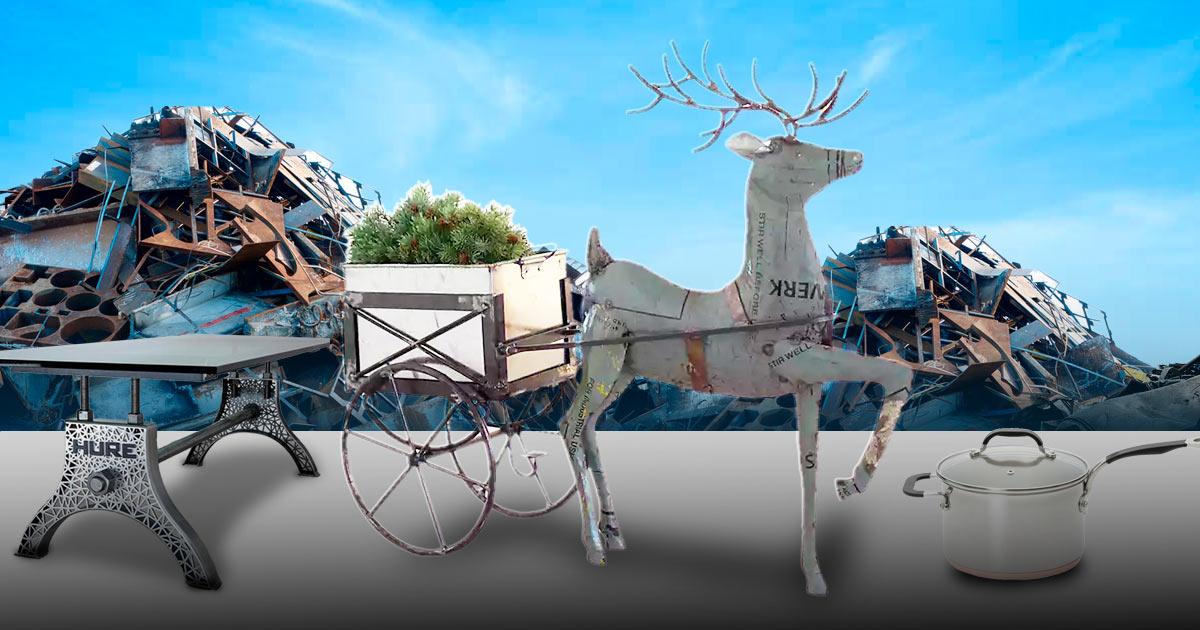Exploring Sustainable Metals – An Eco-Friendly Path Forward

Your desire to contribute to a sustainable society is stronger than ever. You actively seek ways to be environmentally responsible in your shopping and dining habits. Likewise, large companies and manufacturers share your commitment. They strive to be the preferred choice for clients and the environment by selecting the most sustainable metals. If you’re curious about the eco-friendly options available to manufacturers, continue reading.
Is Metal Eco Friendly?
Are metals environmentally friendly? The answer depends on various factors, including the specific metal, its extraction and production methods, and how it is used and disposed of.
Some metals can have a lower environmental impact compared to others. For example, recycled metals can be considered more eco-friendly because they reduce the need for new mining and extraction. Additionally, certain metals, such as aluminum, are highly recyclable and can be reused repeatedly without significant loss of quality.
When considering the eco-friendliness of metals, it’s also essential to look at their lifecycle. Proper use, maintenance, and end-of-life management can significantly influence their overall environmental impact. Recycling and responsible disposal of metals are crucial to ensure their sustainable use.
Scrap Metal
Choosing scrap metal for your project offers several advantages. First and foremost, it reduces the demand for new metal extraction and mining, which can be resource-intensive and harmful to the environment. By opting for scrap metal, you help divert materials from landfills and give them a new life. This contributes to a circular economy, where resources are reused, reducing the need for raw material extraction.
Moreover, using scrap metal can showcase your commitment to sustainability and eco-consciousness. It demonstrates that you value responsible consumption and are actively seeking alternatives that align with your environmental values. Your decision to prioritize scrap metal not only benefits the planet but also sets an example for others in the industry.
Before embarking on your project, take the time to research and visit your local metal shop. Engage with the knowledgeable staff who can guide you through the selection process. They can provide valuable insights into the available scrap metal options and help you find the most suitable materials for your specific project requirements.
Recycled Metal
The advantages of using recycled metals go beyond their reduced energy requirements. By opting for recycled materials, you contribute to the conservation of natural resources. Traditional metal production relies on extracting raw materials from the earth, which can lead to habitat destruction, soil erosion, and the depletion of finite resources. However, by embracing recycled metals, you help alleviate the strain on these resources and promote a more sustainable approach to manufacturing.
In addition to their environmental benefits, recycled metals often exhibit comparable quality and performance to virgin metals. With advancements in recycling technologies, recycled metals undergo rigorous processes to remove impurities and regain their integrity. This means that you can confidently incorporate recycled metals into your projects without compromising on the desired strength, durability, and aesthetic appeal.
Steel
Is stainless steel sustainable? The widespread use of stainless steel stems from its exceptional durability, hygiene, and aesthetic appeal. Its resistance to corrosion, heat, and stains makes it a preferred choice in industries such as architecture, food processing, and medical equipment manufacturing. Moreover, stainless steel’s easy maintenance and long lifespan contribute to its sustainability credentials, as it minimizes the need for frequent replacement.
When considering steel for your projects, it’s crucial to choose the appropriate grade and type that align with your specific requirements. Consulting with experts in the field or reputable suppliers can help you make informed decisions based on factors such as strength, corrosion resistance, and compatibility with your intended application.
Aluminum
Recycling aluminum is not only beneficial from an environmental standpoint but also economically advantageous. The recycling process for aluminum is efficient and cost-effective, allowing for the recovery of valuable material without significant energy expenditure. In fact, recycling aluminum consumes only a fraction of the energy required to produce new aluminum from raw materials, making it an energy-saving alternative.
Aluminum alloys, such as quality aluminum bronze, offer additional benefits in specific applications. One notable application is in marine environments where corrosion resistance is crucial. Aluminum and its alloys exhibit excellent corrosion resistance properties, making them highly suitable for marine applications. The use of aluminum in marine construction, boat building, and offshore structures ensures long-term durability and reduced maintenance needs, contributing to a sustainable approach in these industries.
Considering the versatility and recyclability of aluminum, it is a material that aligns with your eco-conscious efforts. By choosing environmentally friendly aluminum and participating in aluminum recycling programs, you contribute to the conservation of resources, energy savings, and the reduction of waste in landfills.
Choose Sustainable Metals for Your Future Projects
Metal plays a significant role in our lives, and understanding its environmental impact is essential. While the eco-friendliness of metals varies, there are numerous options available that can contribute to a more sustainable approach. The use of scrap metal reduces the need for new mining and extraction, promoting a circular economy and minimizing waste. Opting for recycled metals conserves resources and reduces the strain on the environment caused by traditional metal production.
So, continue to make informed choices, explore sustainable options, and engage with reputable suppliers and experts in the field. Together, we can create a world where the use of metals goes hand in hand with environmental responsibility, forging a path towards a truly sustainable and thriving planet.
